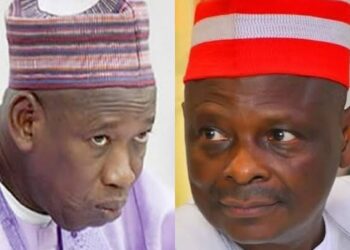Nigeria’s dismal profile in basic infrastructure and the need for cross sector partnership alternatives to bridge the gap dominated the main business session at the recent 38th edition of the Kaduna International Trade Fair. DAVID AGBA reports
The trade fair was organised by the Kaduna Chamber of Commerce, Industry, Mines and Agriculture (KADCCIMA) and it was held at a very auspicious time in the history of Nigeria, when the country is still battling to get out of economic recession.
No less a personality as the former President, Chief Olusegun Obasanjo directed proceedings at a seminar on “Promoting Public Private Partnership as Panacea for accelerated Growth and Development”. Speakers at the seminar took turns to stimulate debates on the narrative of deploying enormous resources and expertise available in the organised private sector to engender economic growth and national development.
A World Bank and Private Infrastructure Advisory Facility data has indeed underscored the importance of the private sector in growing the economy of developing countries steadily from 1997. That was when many governments turned to the Public Private Partnership (PPP), model for designing, building, financing and operating new and existing public facilities for service improvement and project delivery.
Good as it seems, most countries still suffer huge infrastructural deficits, seeing through paucity of funds and capacity; experienced and qualified professionals to reduce the shortfall identified in projects and service delivery.
By turning to the private sector for partnership therefore, governments hope to harvest from their efficient resources, quality assurance, exposure to less-risk long term liquidity and timely projects delivery.
The PPP concept is not at variance with the acceptable contract deals between two legs involving government as public sector and private investors who enter into contractual agreement to offer services with specific time lines, outcomes and benefits to each parry.
Accountability for provision of the service is in the hand of government under the PPP concept; all there is are the contractual relationship between the government and the private sector. Besides offering services and infrastructure, this model has been used to generate jobs, take millions out of poverty and create wealth.
Donald Kaberuka, Rwandan economist and former president of the African Development Bank said in the book, Towards a Smart Partnership for Transformation: “There is little doubt that the challenges of inclusion, widening the production base, moving up the value chain and unlocking Africa’s internal market will require strategic and innovative partnership that need to be forged between the state and the private sector.”
The statement is a pointer to the development direction for global business interventions, but for Africa in particular, it raises more posers on the imperatives of embracing the PPP model for infrastructures and services.
The 2015 Infrascrope: Evaluating the Environment for Public Private Partnership in Africa ranked Nigeria 13th out of the 15 African countries examined in the work. Nigeria scored 31.3, while South Africa led the group by scoring 75.0. Angola and Democratic Republic of Congo, DRC trailed Nigeria from behind.
In coming to this conclusion, regulating laws for the PPP in Nigeria was adjudged strong on the paper but weak in practice. Accusing fingers were pointed at the processes of contract bidding and tendering noted to inhibit transparency and openness, as well as unwieldy alternative dispute resolution mechanisms that have bogged down fantastic projects via needless litigation between the contractual parties.
Similarly, the guest speaker at the gathering, former Minister of Finance, Dr. Shamsudeen Usman scored the regime of ex-President Olusegun Obasanjo highest, saying about 90 percent of the nation’s PPP projects were implemented under him.
Usman was quick to reel out the concessions of the Muritala Muhammed International Airport 2 terminal, the Garki Hospital and many others to justify his claims.
He however admitted that the envisaged benefits of the initiatives were affected by undue political interference and policy inconsistency, weak legal and institutional frameworks, inexperienced personnel and dearth of professionals in the sector.
The unpredictable political environment with policy uncertainties equally pose threats to the willingness of foreign investors in particular to move in resources to grow the Nigerian economy and contribute to the infrastructural development.
In the same veil, Usman identified duplication and overlapping roles of regulatory agencies alongside lack of coordination as parts of the challenges the PPP idea is facing in the country.
According to the National Integrated Infrastructure Master Plan draft (2013), Nigeria requires about $2.9 trillion in 30 years to close its infrastructural gap; that was the period the country was spending only $10 billion on its infrastructure at lower interest rate.
Indeed, the president of the Kaduna Chamber of Commerce, Industry, Mines and Agriculture, Dr. Muheeba Farida Dankaka agrees that: “The country has significant infrastructure challenges and will require gargantuan efforts on the part of government and citizens if we are to join the
league of economically developed nations of the world.”
Furthermore, she noted that “recent reports (2016) suggest that the country requires between $12 to 15 billion annually for the next six years to meet the infrastructure requirements. At current market rates, this amount to over N7 trillion per year.”
Dankaka wondered how government alone can meet these targets when the 2016 and proposed 2017 budgets, altogether touted to be largest in the nation’s history only stood between N6 to N7 trillion.
As a way out, speakers at the seminar believed, that much is expected from government to lead the way in achieving infrastructure targets through the involvement of the private sector.
As a way forward, participants charged legislators to pass the National Planning and Prospects Continuity Bill – a document formulated to enshrine continuity in policy towards reaping considerably from the cross sector partnership between government and the private sectors.
They called on government to strengthen the institutional and legal frameworks while demanding commitment from governments at the highest political levels to be focused.
The National President of the Nigerian Chamber of Commerce, Industry, Mines and Agriculture (NACCIMA), Bassey Edem, suggested that government can open up the space by creating enabling environment for the organized private sector; imploring government at all levels, especially states to replicate the initiative like the Lekki Expressway built by the private sector for Lagos State.
“The general impression of every Nigerian is that government should do everything but that no longer the vogue in the world. Government has limitations in terms of funding and even capability. The organized private sector used to be the engine of growth in the country. The private sector has a part to play in the development of any country.
“If the organized private sector that has the capability and funds could liaise and come in contact with government that is responsible for policy and make it conducive for business to thrive can come together to do a business, I’m sure it’s going to thrive,” Edem said.
He said the private sector could intervene in many sectors of the economy, especially power, which is the key factor of the Nigerian economy.
The NACCIMA president stressed that for the nation to increase its power generation and other projects, the federal government needs partnership with private investors.
Bassey said PPP holds the key as a viable funding model and solution to the economic challenges confronting the nation.
Kaduna state Governor, Mallam Nasir El-Rufai expressed sadness that the Code of Ethics designed as rules for the Bureau of Public Enterprises was jettisoned after leaving the Bureau as its director general.
He identified lack of long-term planning as one of the problems confronting the nation.
He said the Kaduna Infrastructural Master Plan is estimated at N800 billion where the private sector is expected to contribute some 60 per cent of the sum in pursuit of Public Private Partnership.



